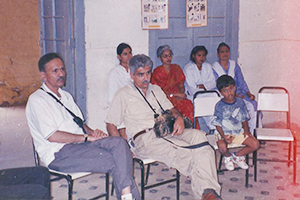Alumni Spotlight
Dr Philomena Drago
Medical Director and General Surgeon in Love&Trust Hospital - Chachro, Sindh, Pakistan
Consultant General Surgeon at St.Teresa's Hospital - Mirpurkhas, Sindh, Pakistan
1) What led to your decision to focus on serving communities in rural Sindh and what has kept you there? Please elaborate on the impact of the work you do, and some of the major triumphs along the way.
Dr Mushtaq initially gave me the chance to work in Singel, in the northern areas of Pakistan, in 1991. However, I had no intention of committing to rural development until I met my husband. He was committed to rural development and persuaded me to leave AKU to serve in Kunri. I haven’t looked back since.
What has kept me here is the drive to improve the quality of healthcare in a low resource setting and creating impact by training local doctors who have gone on to provide quality care in diverse rural locations.
My major triumph is being instrumental in setting up a Secondary Care Hospital in Chachro, an old market town in the Thar desert. In 1996, we at Kunri Christian Hospital (KCH) noticed that many ruptured uteri cases came from Chachro. On further investigation and talks with local traders, a dire need was expressed for a Mother and Child Healthcare Center (MCHC) in Chachro. My huband Paul, the then General Manager of KCH, felt it would be too difficult for us to manage from Kunri, a 4 hour drive away but he challenged the locals to set up with own CBO to run the MCHC; we would provide a midwife and helper with monthly visits by me. A Korean General Surgeon, Dr Drmin also visited one month and was inspired by the work we were doing. And Love and Trust Hospital (LTH) Chachro is the result.
2) Have the challenges you faced during the initial years of your practice changed from the ones you face today? How have you dealt with some of those challenging ground realities?
The biggest challenge is that qualified staff to run rural institutions is always in short supply. However, during my 28 years of work in healthcare I have seen a definite improvement in patient awareness and coming to the healthcare provider in time. Much of the credit for that improvement goes to NGO workers who spread healthcare education in the field.
The most dramatic improvement for us has been the Sehat Card. LTH is the panel hospital in our area for the Sehat Card, which started 2 years ago. Thanks to this facility, people with chronic debilatating problems, like kidney, bladder & gall stones, prolapsed uteri & hernias, can now be treated in their own area - free of cost. And many lives of mothers and babies are saved due to timely c-sections, thanks to this initiative.
3) From your time at AKU, do you have a favourite moment, anecdote or incident that is etched in your memory? How would you describe that journey?
There are too many good moments to elaborate upon. Being from one of the first batches of surgical residents, we were treated like first-born children, given all the attention and training from a wonderful fresh new faculty.
The journey was one of long hours, hard work, and friendship - once made lasting the rest of our lives.
4) In your vast experience, what are the most pressing healthcare needs of our people? Where are we as a healthcare community doing well, and where do we need more effort and investment?
We are still a long way from providing quality, affordable healthcare-for-all. One of the major problems is the brain drain; missing institutional support (quality of education) for young doctors with school age children who wish to serve people in rural areas; and the fight against quackery and unethical practices.
Where we are doing well is in public-private partnerships, like PPHI, where funding is provided and the local healthcare is supervised. More effort and investment is being made, but a lot more needs to be invested to ensure that doctors are adequately trained.
5) If you had a time machine, which period of your journey as a healthcare professional would you like to revisit, and why? Would you change anything about that time?
I would ask the time machine to take me back to my AKHSP service at Singel. I would do nothing different. Everything was perfect; the people, the place and the exposure to rural healthcare. This was the start of my love-affair with our rural areas.

